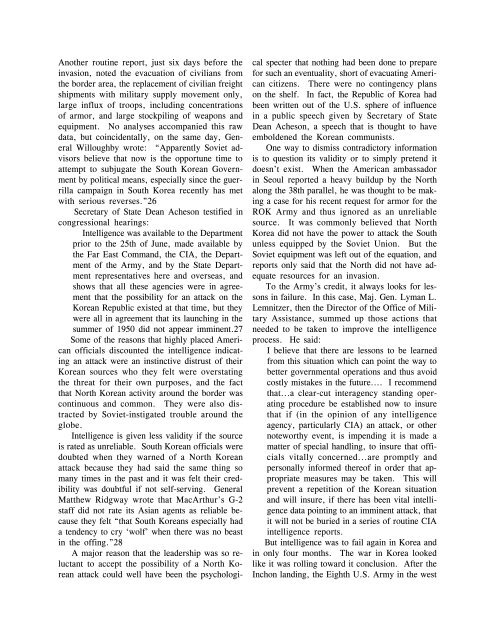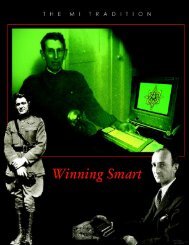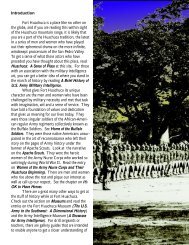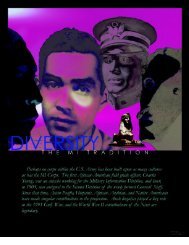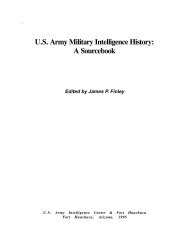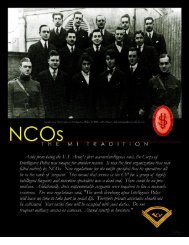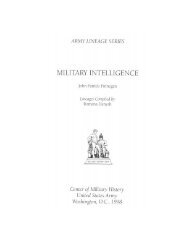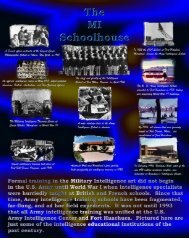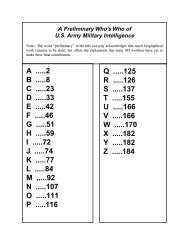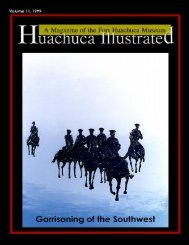The Uncertain Oracle: Some Intelligence Failures ... - U.S. Army
The Uncertain Oracle: Some Intelligence Failures ... - U.S. Army
The Uncertain Oracle: Some Intelligence Failures ... - U.S. Army
- No tags were found...
You also want an ePaper? Increase the reach of your titles
YUMPU automatically turns print PDFs into web optimized ePapers that Google loves.
Another routine report, just six days before theinvasion, noted the evacuation of civilians fromthe border area, the replacement of civilian freightshipments with military supply movement only,large influx of troops, including concentrationsof armor, and large stockpiling of weapons andequipment. No analyses accompanied this rawdata, but coincidentally, on the same day, GeneralWilloughby wrote: “Apparently Soviet advisorsbelieve that now is the opportune time toattempt to subjugate the South Korean Governmentby political means, especially since the guerrillacampaign in South Korea recently has metwith serious reverses.”26Secretary of State Dean Acheson testified incongressional hearings:<strong>Intelligence</strong> was available to the Departmentprior to the 25th of June, made available bythe Far East Command, the CIA, the Departmentof the <strong>Army</strong>, and by the State Departmentrepresentatives here and overseas, andshows that all these agencies were in agreementthat the possibility for an attack on theKorean Republic existed at that time, but theywere all in agreement that its launching in thesummer of 1950 did not appear imminent.27<strong>Some</strong> of the reasons that highly placed Americanofficials discounted the intelligence indicatingan attack were an instinctive distrust of theirKorean sources who they felt were overstatingthe threat for their own purposes, and the factthat North Korean activity around the border wascontinuous and common. <strong>The</strong>y were also distractedby Soviet-instigated trouble around theglobe.<strong>Intelligence</strong> is given less validity if the sourceis rated as unreliable. South Korean officials weredoubted when they warned of a North Koreanattack because they had said the same thing somany times in the past and it was felt their credibilitywas doubtful if not self-serving. GeneralMatthew Ridgway wrote that MacArthur’s G-2staff did not rate its Asian agents as reliable becausethey felt “that South Koreans especially hada tendency to cry ‘wolf’ when there was no beastin the offing.”28A major reason that the leadership was so reluctantto accept the possibility of a North Koreanattack could well have been the psychologicalspecter that nothing had been done to preparefor such an eventuality, short of evacuating Americancitizens. <strong>The</strong>re were no contingency planson the shelf. In fact, the Republic of Korea hadbeen written out of the U.S. sphere of influencein a public speech given by Secretary of StateDean Acheson, a speech that is thought to haveemboldened the Korean communists.One way to dismiss contradictory informationis to question its validity or to simply pretend itdoesn’t exist. When the American ambassadorin Seoul reported a heavy buildup by the Northalong the 38th parallel, he was thought to be makinga case for his recent request for armor for theROK <strong>Army</strong> and thus ignored as an unreliablesource. It was commonly believed that NorthKorea did not have the power to attack the Southunless equipped by the Soviet Union. But theSoviet equipment was left out of the equation, andreports only said that the North did not have adequateresources for an invasion.To the <strong>Army</strong>’s credit, it always looks for lessonsin failure. In this case, Maj. Gen. Lyman L.Lemnitzer, then the Director of the Office of MilitaryAssistance, summed up those actions thatneeded to be taken to improve the intelligenceprocess. He said:I believe that there are lessons to be learnedfrom this situation which can point the way tobetter governmental operations and thus avoidcostly mistakes in the future.... I recommendthat...a clear-cut interagency standing operatingprocedure be established now to insurethat if (in the opinion of any intelligenceagency, particularly CIA) an attack, or othernoteworthy event, is impending it is made amatter of special handling, to insure that officialsvitally concerned...are promptly andpersonally informed thereof in order that appropriatemeasures may be taken. This willprevent a repetition of the Korean situationand will insure, if there has been vital intelligencedata pointing to an imminent attack, thatit will not be buried in a series of routine CIAintelligence reports.But intelligence was to fail again in Korea andin only four months. <strong>The</strong> war in Korea lookedlike it was rolling toward it conclusion. After theInchon landing, the Eighth U.S. <strong>Army</strong> in the west


